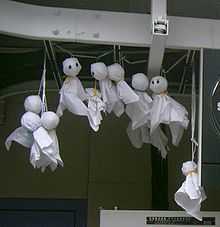Teru teru bozu

Teru teru bōzu (Japanese: 照る照る坊主、てるてる坊主; literally "shine shine monk") is a little traditional handmade doll made of white paper or cloth that Japanese farmers began hanging outside of their window by a string. In shape and construction they are essentially identical to ghost dolls, such as those made at Halloween. This amulet is supposed to have magical powers to bring good weather and to stop or prevent a rainy day. "Teru" is a Japanese verb which describes sunshine, and a "bōzu" is a Buddhist monk (compare the word bonze), or in modern slang, "bald-headed"; it is also a term of endearment for addressing little boys.[1]
Teru teru bōzu became popular during the Edo period among urban dwellers,[2] whose children would make them the day before the good weather was desired and chant "Fine-weather priest, please let the weather be good tomorrow."[2]
Traditionally, if the weather does turn out well, eyes are drawn in (compare daruma), a libation of holy sake (神酒) is poured over them, and they are washed away in the river.[3][4] Today, children make teru-teru-bōzu out of tissue paper or cotton and string and hang them from a window when they wish for sunny weather, often before a school picnic day. Hanging it upside down acts like a prayer for rain. They are a very common sight in Japan.
There is a famous warabe uta, or Japanese nursery rhyme, associated with teru teru bozu, written by Kyoson Asahara and composed by Shinpei Nakayama, that was released in 1921. Like many nursery rhymes, this song is rumored to have a darker history than it first appears. It allegedly originated from a story of a monk who promised farmers to stop rain and bring clear weather during a prolonged period of rain which was ruining crops. When the monk failed to bring sunshine, he was executed. Many Japanese folk historians, however, believe this story and others regarding the origins of teru teru bozu may have originated from long after the tradition had become widespread, most likely in an attempt to refine the image of the doll. It is more likely that the "bōzu" in the name refers not to an actual Buddhist monk, but to the round, bald monk-like head of the doll, and "teru teru" jokingly referring to the effect of bright sunlight reflecting off a bald head.
References
| Wikimedia Commons has media related to Teru teru bōzu. |